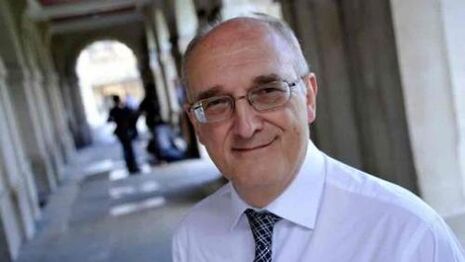Cambridge Vice-Chancellor attacks immigration policies
Professor Sir Leszek Borysiewicz has spoken about his hatred of curbs on immigration

In an interview with the Guardian, the University of Cambridge's Vice-Chancellor, Professor Sir Leszek Borysiewicz, has spoken of his opposition to "crude" quotas and other limits which seek to control Britain's net migration.
Born in Cardiff in 1951 to Polish refugees, Borysiewicz explains that he 'abhors' the idea that politicians currently set a limit of 100,000 migrants per year coming into Britain. He claims that reducing the matter of immigration to numerical values masks "the true potential benefit that people coming to Britain can actually have." He would prefer the government to look "at the capacity of individuals to contribute to our society here rather than have a political ding-dong over 'we brought in 10,000 fewer than you did'."
After the Guardian's university league tables revealed that Cambridge has defended its top-place position for the fourth year running, Sir Leszek notes that although Cambridge has not experienced falling international application numbers, there is a perception that Britain is no longer as welcoming as it once was. He points to India as an example, with statistics showing that the number of Indian students coming to Britain to study fell by 38 per cent between 2011 and 2012.
This comes as UKIP's victory in the European elections appears to indicate greater support for a closed-door approach to the EU and its policy of the free movement of citizens from members states. The government's statistics on net migration include those who migrate for the purposes of higher education, although Labour has indicated that they may change this policy if they win the next general election. Sir Leszek reiterated calls made by other university vice-chancellors opposing moves for Britain to leave the EU. He argues that links with the rest of the world, supported by open immigration policies, ensure that Britain's universities remain open to external funding. Currently, 15-20 per cent of the UK's higher education sector funding comes from Brussels.
Borysiewicz has stressed the importance of outward-facing immigration policies for the global success of Britain's universities. He explains that "A university such as Cambridge competes with Princeton, Harvard, Stanford, much more so than other UK universities, and therefore anything that prevents us getting the very best students I believe would be to the long-term detriment of the United Kingdom."
Borysiewicz, who only spoke Polish until he went to school, has also spoken of the importance of bilingualism for first- and second-generation immigrants, whilst also noting a British "laziness" when it comes to language-learning. Cambridge has seen application levels for language degree courses drop sharply over the last few years; from 580 in 2010 to 380 this year. He identifies this as "a problem, particularly in an international world", and could come to threaten Britain's ability to remain competitive in this increasingly global age.
 News / Clare Hall withdraws busway objections after spending over £66k on lawyers10 November 2025
News / Clare Hall withdraws busway objections after spending over £66k on lawyers10 November 2025 News / Stolen plate returned to Caius after 115 years12 November 2025
News / Stolen plate returned to Caius after 115 years12 November 2025 Comment / Be mindful of non-students in your societies12 November 2025
Comment / Be mindful of non-students in your societies12 November 2025 News / Two pro-Palestine protests held this weekend11 November 2025
News / Two pro-Palestine protests held this weekend11 November 2025 Fashion / You smell really boring 13 November 2025
Fashion / You smell really boring 13 November 2025










